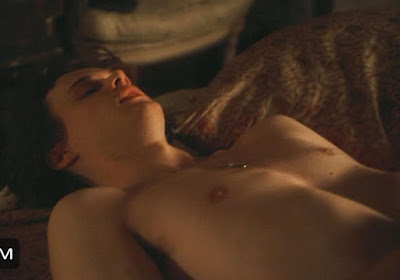I reviewed The Summer I Turned Pretty last summer, and said it had a lot of gay potential. The second season just dropped on Amazon Prime, so I'll see if any of that potential was realized. The premise: a poor girl (actually upper-upper middle classt and her famous-writer mother spend the summer with Mom's ultra-rich ex-girlfriend and her two hot teenage sons, both of whom are in love with her.
Season One Recap: Not promising. I lost track of the number of boy-girl smooches. It looks like both brothers and a third guy are in love with her. For a girl named "Belly," she gets a lot of action. The only other plot point appears to be either Mom or her ex-girlfriend dying of cancer.
Scene 1: It's the second summer that Belly's been pretty. She lounges by the pool, the two brothers. Psych! It was a daydream! She's actually in class, she's broken up with Conrad, and the lady with cancer has died. "Escaping to your dreams is easier than living with your memories," she muses. But not to worry, Corey (Louis Tomeo, left), the hot guy who sits in front of her picked this moment to flirt. Except we never see him again. He's just there to signify that everyone is intensely attracted to Belly.
Switch to Belly smooching with Conrad (Christopher Briney, top photo), the first of the brothers "This almost doesn't seem real." Psych! This one isn't a dream -- it's a memory from last summer.
The memory continues: Conrad tells her how much he loves her, Belly drops a bombshell: "Your brother and I have been dating, too. He's got a bigger cock than you, but you are better looking. I don't know which to choose." Ok, I may have edited the dialogue slightly.
Conrad talks her into breaking up with Cock Boy. They sneak into the house and talk to Cancer Mom, who is delighted to see that her son is heterosexual. They grin and giggle for a long time, enjoying their shared heterosexual privilege.
Scene 2: Back in the present, the teacher dismisses the class for the summer. Despondent, Belly starts unloading her locker. A clump of girls tries to talk her into volleyball camp, and Steven (Sean Kaufman, left) whoops and hollers about going to Princeton in the fall. He just found out now?
His friend, a long-haired boy named Spike (Colby Burton), rushes up, exuberant about the upcoming graduation party: "I'm dating the singer." One of the girls complains that his boyfriend is a "Machine Gun Kelly wannabe."
Since when do 1930s gangsters sing? Oh, he's actually an alternative rock/hip hop singer. So unless I misunderstood the dialogue, Spike is dating a boy.
Next Belly's counselor tells her that her grades took a nosedive, and she dropped out of volleyball, so her chances of getting into a good college are nil. That's not true. I got a D in chemistry and still got into a...um...college. "Have you thought of Finch Blockhead Academy? They let in anyone with money."
More Cock Boy after the break








































